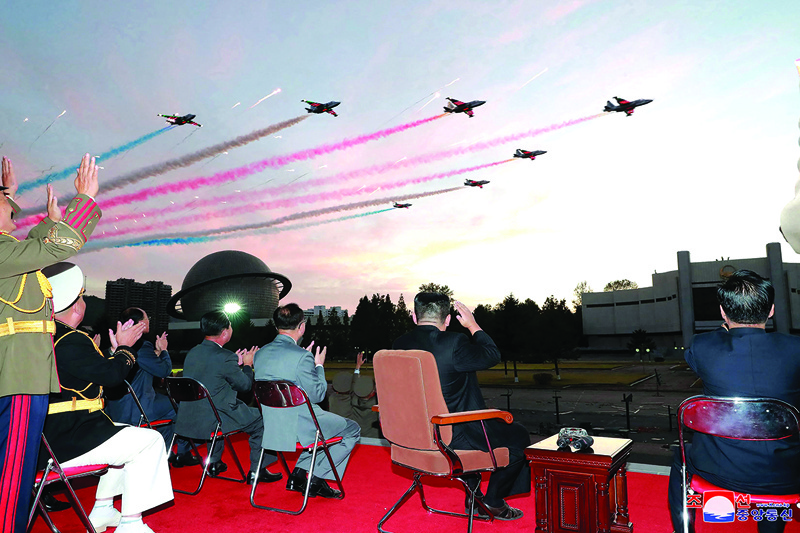 PYONGYANG: North Korean leader Kim Jong Un (2nd right) watches a demonstration flight during the opening ceremony of the defense development exhibition ‘Self-Defence-2021’ in Pyongyang. – AFP
PYONGYANG: North Korean leader Kim Jong Un (2nd right) watches a demonstration flight during the opening ceremony of the defense development exhibition ‘Self-Defence-2021’ in Pyongyang. – AFPSEOUL: A shirtless soldier smashes two glass bottles together, adding to a pile of shards on the ground as North Korean leader Kim Jong Un looks on, grinning. The man lies down on the debris and a comrade puts a thick concrete block on his chest, before smashing it with a sledgehammer. The scene was part of a pain-defying display put on by the North Korean army for the opening of a defense exhibition this week that showcased the nuclear-armed country's weapons.
The soldiers-some in uniform, others topless-punched their way through layers of concrete bricks, or broke them with their heads. Others were hammered on their arm or hand, and one lay on a bed of nails to have a block broken on his chest. Leader Kim looked on clapping and smiling, surrounded by officers and with his sister and close adviser Kim Yo Jong at his side, footage on state broadcaster KCTV showed Tuesday.
Korea has a long tradition of martial arts, and breaking is part of its indigenous sport of taekwondo-developed by a South Korean general who later fell out with the South's military-backed dictator Park Chung-hee and became a frequent visitor to Pyongyang, where he died in 2002. It is now often used by the North to symbolize its military prowess. "These soldiers, embraced and raised by our party, have demonstrated to the whole world the strength, bravery and morale of the Korean People's Army," newsreader Ri Chun-hee-the North's most famous presenter-said over the images.
The arms exhibition-at which Kim blamed the United States for tensions on the peninsula and accused the South of hypocrisy-is part of the commemorations for the anniversary of the foundation of the ruling Workers' Party. Kim has overseen rapid progress in Pyongyang's banned nuclear weapons and ballistic missile programs, which have earned it multiple international sanctions. And Ri did not forget to declare the source of the participants' strength. It was "bestowed upon them by our dear leader Kim Jong Un", she said.
'Starvation risk'
Meanwhile, North Korea's most vulnerable are "at risk of starvation" with the economy worsening due to a self-imposed coronavirus blockade, and UN sanctions imposed over the country's nuclear programs should be eased, a UN human rights expert said yesterday. The impoverished nation has been behind a rigid blockade since early last year to protect itself from the pandemic, with the economy suffering and trade with key partner China dwindling to a trickle. In June, state-run KCTV admitted North Korea was facing a "food crisis", sounding the alarm in a country with a moribund agricultural sector that has long struggled to feed the population.
The same month, leader Kim Jong Un said the food situation was "getting tense". Ordinary North Koreans are "struggling on a daily basis... to live a life of dignity", and the worsening humanitarian situation could "turn into a crisis", Tomas Ojea Quintana, UN special rapporteur on human rights, said in his latest report. Pyongyang is under multiple sets of international sanctions over its nuclear and ballistic missile programs, which have seen rapid progress under Kim.
Quintana said such restrictions should be eased to protect the country's most vulnerable in the face of a severe food shortage. "The most vulnerable children and elderly are at risk of starvation," he said. "Sanctions imposed by the UN Security Council should be reviewed and eased when necessary to both facilitate humanitarian and lifesaving assistance." The report comes about three months after the UN's Food and Agricultural Organization said North Korea was facing a food shortage of around 860,000 tons this year, and could experience a "harsh lean period".
Pyongyang has stayed away from talks on its nuclear program since the collapse of a second summit between Kim and then US president Donald Trump in Hanoi and has rebuffed South Korean efforts to revive dialogue. Under President Joe Biden, the United States has repeatedly declared its willingness to meet North Korean representatives, while saying it will seek denuclearization. But this week Kim blamed Washington for tensions on the peninsula, and insisted Pyongyang's weapons were for self-defense and not aimed at any particular country. - AFP









